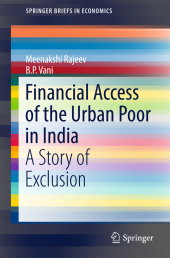 Neuerscheinungen 2017Stand: 2020-02-01 |
Schnellsuche
ISBN/Stichwort/Autor
|
Herderstraße 10
10625 Berlin
Tel.: 030 315 714 16
Fax 030 315 714 14
info@buchspektrum.de |

Meenakshi Rajeev, B. P. Vani
(Beteiligte)
Financial Access of the Urban Poor in India
A Story of Exclusion
1st ed. 2017. 2017. xi, 99 S. 8 SW-Abb. 235 mm
Verlag/Jahr: SPRINGER, BERLIN; SPRINGER INDIA; SPRINGER 2017
ISBN: 8132237102 (8132237102)
Neue ISBN: 978-8132237105 (9788132237105)
Preis und Lieferzeit: Bitte klicken
This book focuses on the issue of financial exclusion with particular reference to the urban informal sector in India. Continuing the work of its predecessor, the current Government of India is also placing considerable importance on driving policy initiatives for financial inclusion. However, financial exclusion in urban areas, especially of the lower strata of the society has not received the attention it deserves from researchers and policymakers, even though urban poverty and deprivations are of considerable importance in the present Indian context. The challenges of financial inclusion and accessibility in the urban areas differ substantially from those found in the rural regions given the fact that the possibility of physical access to financial services is much higher in urban areas. In order to provide a macro perspective, the book begins with an analysis of the unit record data on nature and extent of financial inclusion and access to credit in urban India, based on Debt and Investment survey data (59th and 70th rounds) provided by the National Sample Survey Office (NSSO). In subsequent steps, the book discusses findings from a primary survey carried out in the state of Karnataka of self-employed persons engaged in informal services sector. This exercise has helped to comprehend the ways in which they currently meet their financial needs for different income generating purposes, the terms and conditions under which they do so, and the challenges that remained for possible interventions. Experiences of other developing nations in their attempts to ensure financial inclusion and the lesson learnt thereby are the other highlights of the book.
Chapter 1. Introduction.- Chapter 2. Review of Literature (provides a brief review of literature which highlights the importance of financial inclusion (FI) for reduction of poverty and enhancement of growth & development, and essential infrastructure required for carrying out an effective FI programmes.).- Chapter 3. Credit access of Urban Households: A Study of NSSO Data (analyses NSSO debt and investment survey (59th round) data to understand the nature and extent of accessibility to credit by different sections of people, classified according to various income and social categories. - Chapter 4. Sampling Techniques (describes the survey methods and sample regions).- Chapter 5. Basic Sample Characteristics (presents basic characteristics of sample observations).- Chapter 6. Understanding financial exclusion for urban households (provides a detailed analysis of data on the level of financial inclusion and its determinants).- Chapter 7. Concluding remarks and policy implications. In addition the authors want to add two more chapters on 1. Financial Exclusion: Experiences from Developing nations across the globe 2. Cash transfer and international experience can be added.


